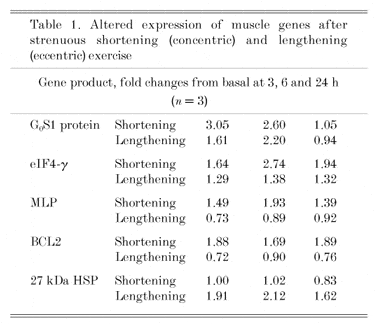To detect altered transcription of muscle genes we probed samples of muscle RNA obtained before and after a bout of strenuous exercise, involving both ‘concentric’ and ‘eccentric’ exercise, with the Affymetrix Human MuscleChip microarray. The Tayside Ethics Committee approved the study. We studied three healthy young men (21.3 ± 0.6 years, BMI 24.3 ± 1.15, means ± S.E.M.) over 24 h. The subjects, carrying 25 % body wt, stepped up with one leg onto a knee-high box and stepped down with the other at ~1 step s-1, for 6 min, then twice for 3 min with 2 min rests between. Quadriceps biopsies were taken (using 1 % lignocaine anaesthesia) by the conchotrome technique, before and 3-24 h after exercise. Subjects were given 42 g glucose and 15 g of essential amino acids orally over the 2 h preceding each biopsy. Homogenized muscle was treated with Trizol LS to isolate total RNA. Labelling of the RNA and hybridization to the Human MuscleChip were carried out by established procedures. About 70 genes showed robustly identifiable marked changes in response to the exercise stimuli, often with differential responses with time or mode of contraction.
Among the most striking changes (Table 1) were those for genes associated with muscle growth and fibre-type transitions and initiation of protein synthesis (e.g. Muscle Lim Protein (MLP), and BCL2, eIF4-γ), control of cell cycle activity (e.g. the G0S1 protein) or with eccentric exercise cell damage (27 kDa Heat Shock Protein).
The results should provide clues as to the early events involved in controlling the adaptive changes in human muscle after altered states of physical activity.
This work was supported by the UK Medical Research Council.

